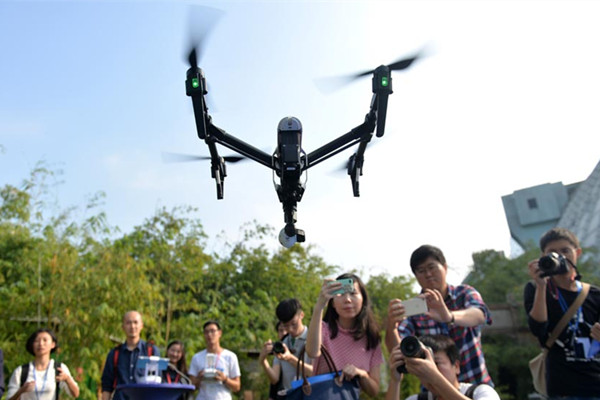
19 Dec, 2014
Drone shot down in Beijing suburb, operators charged
Beijing, (Chinadaily.com.cn), 2014-12-16 — Three people have been charged with involuntarily endangering public security by flying drones for surveying and mapping, according to a recent report in People’s Liberation Army Daily.
 A camera drone is tested outdoors on Nov 26, 2014 in Shenzhen, Guangdong province of China. [Photo/cfp] |
The drone forced several commercial airliners to alter their paths or delay their flights before it was shot down by air force, the report said.
The incident happened on Dec 29, 2013, when the military radar detected an air emergency near an airport in Beijing suburb. Air force commander immediately ordered several regiments of an air division and ground-to-air missiles to be combat ready. Six teams were dispatched to the target area.
Six minutes later, the object was identified as a small aircraft. The information was submitted to air force command and public security departments in Beijing and neighboring Hebei province.
An attack helicopter was sent to investigate the situation. Minutes later, the target was identified as a white drone.
The drone posed a threat to the security of the capital city after repeatedly ignoring the warning and flying in the direction of Beijing, the report said. The air command then decided to avoid densely populated area and attack the drone with shotgun.
After being shot, the drone fell in Beijing’s northeastern Pinggu district, where the investigators found three operators and a vehicle.
The aircraft turned out to belong to a Beijing-based technology company, which didn’t submit a request to aviation and air force authorities beforehand, the report said.
Such incidents are not uncommon. As authorities’ attempt to reform low-altitude airspace management continues, aircraft for general aviation, including small airplanes and hot-air balloons, are growing at a rate of 15 percent annually.
When emergency occurs, the air force in Beijing will have to alert at least 10 regiments and missiles in several locations, as well as fighters. The operation will force several commercial airliners to alter their paths or delay their flights, a huge loss of resources, the report said.
In China, airspace below 1,000 meters is controlled by the military. Therefore, the low-altitude airspace reform only facilitates the flights with certain qualifications. And all the low-altitude aviation activities must be permitted by aviation regulation authorities before being carried out.
But flying without approval is common among owners of small general aviation aircraft because they want to avoid the complicated application procedures and long waiting times for approval, said Wu Peixin, an aviation observer in Beijing.



Liked this article? Share it!